Whistleblowers lift lid on staff, funding crisis endangering lives in Victoria health system
The Andrews government has been slammed for “running out of ideas” in the search for ways to fix Victoria’s collapsing hospital system.
Coronavirus
Don't miss out on the headlines from Coronavirus. Followed categories will be added to My News.
The Victorian Liberals have demanded the Andrews government hold a health summit to find ways to fix the state’s collapsing system.
It comes the day after Daniel Andrews has rebuffed suggestions from top hospital figures there were systemic failures in Victoria’s strained health system prior to the Covid pandemic.
The Herald Sun on Wednesday revealed the true extent of the crisis, with whistleblowers declaring Victorian hospitals did not have enough funding or staff to open all their beds.
“We need to have a summit with all health professionals and interested parties of government,” opposition leader Matthew Guy said.
“We need to all come together to work out what those immediate mechanisms are to get the system back up to scratch, whether it’s about triple-zero … or emergency departments.
“We need to fix this crisis now so that Victorians don’t keep dying.”
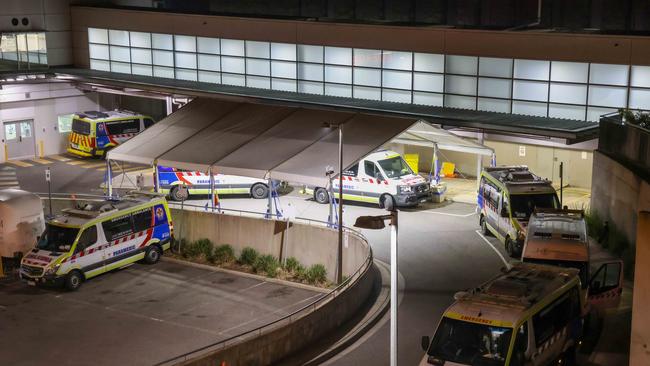
Mr Guy said the biggest concern of health professionals was ramping.
“We see this when ambulances can’t drop patients off (at a hospital) so they ramp and then that ambulance is taken out of the system and can’t go and service another patient,” he said.
“Some ideas have been put to us about extra steps in that process so patients can be registered and then treated.
“Having a summit at least brings people together in a room who know the system, who can tell you about the problems of getting people off ambulances into EDs, the problems with triaging in the system.”
Opposition health spokeswoman Georgie Crozier said the government had “run out of ideas” to fix the “dire” health system.
“It’s not just speaking to selected groups and selected agencies, we need to get clinicians’ views,” she said.
“The government is refusing to acknowledge just how dire the situation is.”
Dan rejects doctors’ diagnosis
Australian College of Emergency Medicine president Clare Skinner said the crisis was caused by “deep structural flaws in the Australian health system” rather than the Covid pandemic.
“Healthcare workers find it really emotionally difficult when we see politicians standing up and saying ‘this is just Covid, this is world-class care, it’ll be all right’,” Dr Skinner said.
But the Premier on Wednesday morning said the extreme stresses now on healthcare workers did not exist before the pandemic hit.
“Sorry, these comments seem to ignore the fact that we’re in a one in 100 year event,” he said.
“The facts are these: we did not have this pressure, there’s always some pressure — (but) all the data tells you very clearly that a wildly infectious virus, the likes of which none of us have seen in living memory, has put enormous pressure on our health system.
“To deny that, I would respectfully say, I don’t believe that’s accurate.
“I’m not in any way suggesting that pre-Covid every day in health was an easy day. There are no easy days, it’s always high pressure, (a) highly challenging environment. That’s why the people who work in it are so highly regarded.”
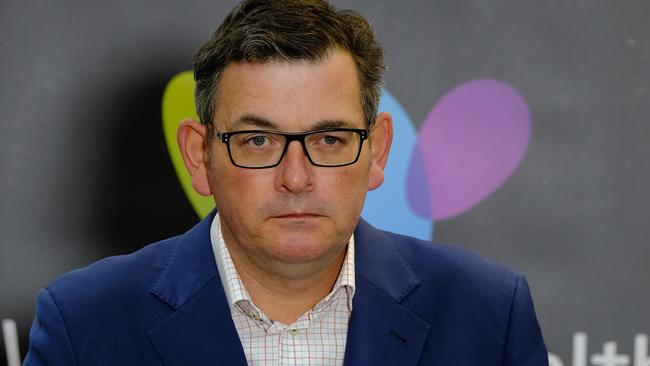
As reported by the Herald Sun, Mr Andrews said the crisis was being fuelled by mass levels of staff fatigue and absences.
“This is not about funding,” he said.
“There’s simply no debate that there is more funding and more staff in the system today than there has been at any point.
“Let’s be very clear, thousands of extra staff and billions of extra dollars — that’s what we’ve done every year that we’ve been in office.
“The key point here is that many of our staff are exhausted and you can’t blame them for that.
“What’s even more important than that fatigue issue, we’ve got on any given day one thousand, two thousand staff who can’t come to work because they are sick. That’s the limiting factor.
“That’s occurring at the time when we’ve got the highest number of patients who need care.”
Mr Andrews said while the majority of Victorians were living “what is pretty close to a normal pre-Covid life”, healthcare workers were still dealing with “enormous pressure”.
“We’re engaged with all the people quoted in your article today, constantly,” he added.
“This is the most challenging period that those highly skilled, highly passionate staff have ever faced, and we’re there to support them 100 per cent.”
Whistleblowers slam lack of funding, staff
Meanwhile, whistleblowers say Victorian hospitals do not have enough funding or staff to open all their beds.
Hospital insiders and industry leaders warn they will not be able to tackle massive surgery backlogs or properly staff wards and emergency departments unless systemic failings are fixed.
Amid snap emergency department shutdowns and as patients are forced to queue in carparks, the crisis has been described as “beyond a perfect storm” by the Australian Medical Association.
A critical shortage of nurses and doctors is part of the problem, as the Covid crisis and historic underresourcing hit home.
On Wednesday, Mr Andrews said work was under way to address workforce shortages in Ambulance Victoria that were forcing police to attend to health situations that usually “wouldn’t attract a police response”.
Police are being called to triage some ambulance jobs when paramedics are not available to attend.
The Herald Sun has confirmed with multiple police sources that officers are being called to medical emergencies, taking them off their usual beat.
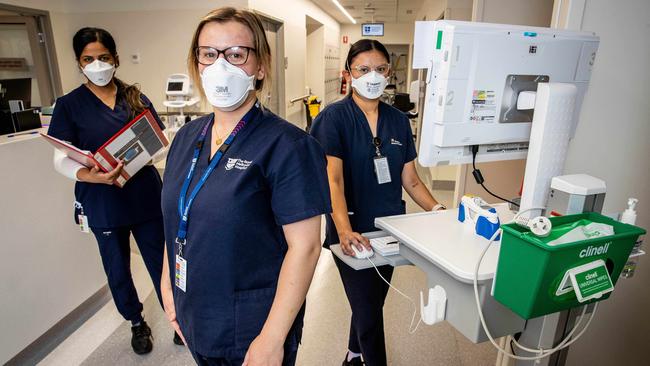
Shadow police minister Brad Battin said the revelation highlighted the true extent of Victoria’s hospital crisis.
The Royal Commission into Victoria’s Mental Health System recommended that people experiencing mental health troubles should be met with a health response rather.
The Premier said while reform was under way, it would take time to implement.
“We are well under way in terms of doing that important work but that’s not a switch that you just flick. That’s a big shift in the way our first responders work,” he said.
“The notion that you can deliver that reform quickly and easily at a time when you’ve got thousands of staff who are not reporting for work because they are sick, and you’ve got tens of thousands of extra patients needing care, common sense just tells you that’s going to be a challenge.”
Police said they had responded to a record number of mental health related calls in the past year but would not comment on whether officers were being taken away from the frontline due to Victoria’s health crisis.
“Victoria Police will continue to support the community responding to mental health, including the as primary response for urgent calls for assistance,” a statement said.
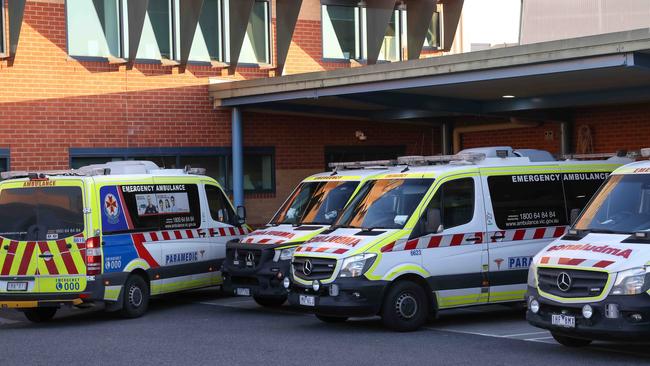
The force said police would continue to support Ambulance Victoria when responding to incidents “involving threats of harm, violence or when a caller believes there is a risk to attending emergency services”.
They declined to specifically respond to media reports saying frontline officers were being taken off regular duties to triage non-urgent ambulance calls.
“Victoria Police responded to more mental health related calls for assistance last year than the previous year, however this is not dissimilar to year on year increases over the previous five years,” the statement said.
The force said mental health apprehensions required police to transfer individuals to hospitals or medical facilities and under current legislation they could not defer this responsibility.
“Work is underway to amend this process, aimed to release police resources earlier in the process of mental health related intervention and response,” the statement said.
The government has committed $12bn in this year’s budget to address critical issues that have led to a string of deaths.
A parliamentary committee heard last week 21 deaths were directly linked to delays in the health system.
Of those 18 were related to delays with crisis-addled triple-0 operator the Emergency Services Telecommunications Authority.
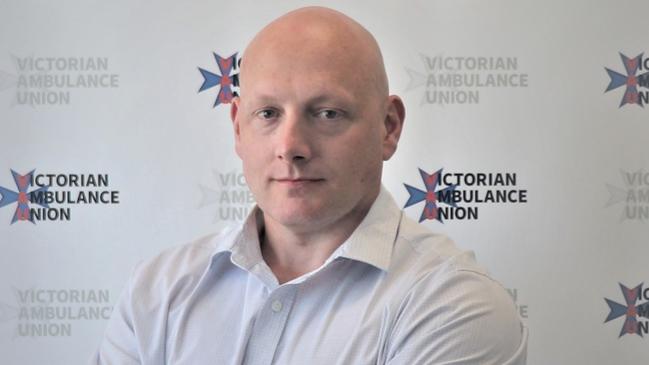
A further three were believed to be a consequence of fatal ambulance delays, but were still being investigated.
“Daniel Andrews’ health crisis is now putting your safety at home at risk with police used for medical call-outs making them unavailable when you’re in danger at home,” Mr Battin said.
“The only way to fix this crisis is to change the government, change the systems, and ensure that the funding, staff and training are there for all paramedics and triple-0 operators.”
Victorian ambulance union boss Danny Hill said police were often called in to help with cases involving mental health.
Mr Hill said it wasn’t a new concept for police services to be used but there was a noticeable increase in the number of cases they were required.
He said this was a clear example of the “sheer overwhelm” of the strained ambulance network.
Mr Hill said it was always the intention for patients with mental health issues to be treated with a health response, rather than a police response.
However, in a statement, an Ambulance Victoria spokeswoman said police were not dispatched to triage ambulance patients.
She said “there are times when both police and ambulance are dispatched to cases that requires both agencies”.
“At times, paramedics will arrive first and wait for police, and sometimes police arrive first,” the spokeswoman said.
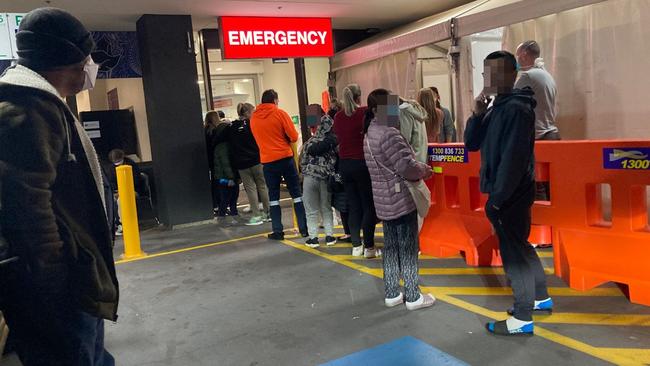
“We work closely with our emergency services colleagues to ensure the best response to the Victorian community.”
Police Association of Victoria chief Wayne Gatt said police were being called upon to transport patients to hospitals in instances where an ambulance should be used.
Non-urgent mental health issues were forming the bulk of those cases, Mr Gatt said
“Police have a role to play from time to time when people might be agitated or dangerous or violent but increasingly what our members are telling us is owing to the absence of adequate numbers of ambulances, for example, police are becoming the primary call to situations that otherwise wouldn’t attract a police response,” Mr Gatt told 3AW radio.
“What is quite regular now is that even when police do attend those instances, and what would be appropriate is to transport a person to hospital, protocols have existed for police for many, many years that would require an ambulance to do that work. That is the most appropriate way to take someone who is sick, not bad, to hospital.
“But the absence of ambulances has meant that police are doing the gross majority of those transports.”
Mr Gatt said police were frequently being told non-urgent ambulance transport was either not available or there were waits of up to four hours.
The Herald Sun revealed last month government modelling showed police were critically understaffed, with 1500 new officers needed over the next four years.
Funding was subsequently set aside to add 500 new police over the coming two years in the budget.
Covid exposed system’s ‘pre-existing cracks’
Concerns have also been flagged that a mere fraction of the funding needed to reach the state’s elective surgeries target to increase procedures to 125 per cent of the pre-Covid rate is so far on offer.
There has been a 10 per cent growth in patient demand since 2020, and hospital insiders say funding agreements brokered with the Andrews government have failed to keep pace.
This demand has led to a blowout in the massive elective surgery waiting list – which was already at 49,326 before the pandemic – to beyond 80,000.
The crisis is being fuelled by mass levels of staff sickness – mainly Covid and flu – which saw 1565 hospital workers off Tuesday, the Herald Sun can reveal. Absences had soared to 1918 a week earlier.
Sources at two of Melbourne’s biggest hospitals have revealed they are unable to open all of their ward beds.
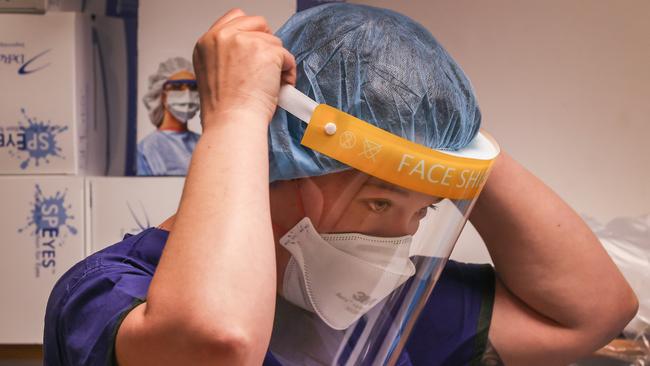
“We just can’t open our beds to capacity, largely due to nurse ratios which we are not funded for,” one source said.
“We are being asked to do more elective surgery, but we don’t even have beds for them to be treated in, or staff to perform the operations.”
Australian College of Emergency Medicine president Clare Skinner said the crisis was caused by “deep structural flaws in the Australian health system” rather than the Covid pandemic.
“Healthcare workers find it really emotionally difficult when we see politicians standing up and saying ‘this is just Covid, this is world-class care, it’ll be all right’,” Dr Skinner said.
“We can tell you that this is not just a Covid-related problem.
“The reality is Covid has only exposed cracks that were pre-existing in the system.”
Six months before the pandemic began, Melbourne’s major hospitals had already been forced to reduce procedures because new requirements for them to provide more nurses for every patient as well as deals to boost wages were not covered by their budget allocations.
This led to an extra 20,000 sick Victorians being added to elective surgery waiting lists.
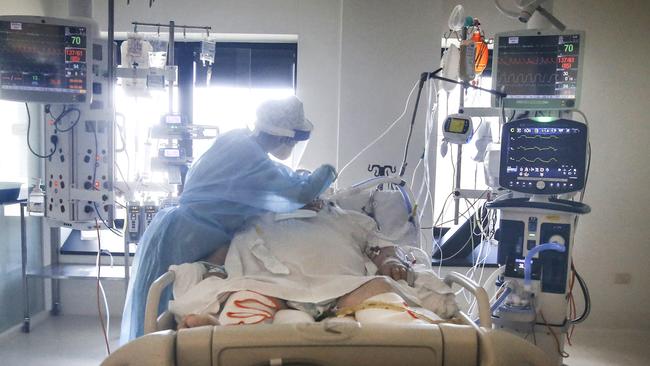
The Royal Children’s Hospital and Monash Medical Centre were forced to close their EDs due to overcrowding on one weekend this month, prompting another round of calls for non-urgent patients not to attend hospitals.
On Monday, patients had to queue through the carpark to get into Sunshine Hospital’s ED from 5pm, waiting more than 100 minutes just to be triaged so they could enter a waiting room.
Medical sources have told the Herald Sun more than 80 per cent of presentations at overcrowded emergency departments were category 1, 2 or 3 patients – meaning they needed to be seen in the ED and were not presenting without a real need.
They also revealed some EDs had to operate at less than a third of capacity during some periods because many cubicles were occupied by the patients “for days on end” as there were no available beds on the wards.
Regional hospitals under pressure
Mildura Base Hospital called a “code yellow” last week, meaning it had no capacity to take new patients.
Insiders say ambulance ramping in Geelong and other regional centres is also causing delays as they battle large numbers of Covid and flu patients.
A senior professional in a major metro hospital said it was a lesson in “not having any latent capacity in our health system”.
“We used to hear most mornings about bed shortages even before the pandemic, now they have Covid and flu (cases) and all the delayed care to catch up on with essentially the same constraints as before, possibly worse due to workforce shortages,” they said.
While the most obvious pressure points of the current crisis are closed or stressed emergency departments and ramped ambulances, health groups unanimously state the overarching cause is a shortage of beds in hospital wards and community resources.
A lack of federally-funded aged-care resources, mental-health beds and delays in NDIS assessments and other community-based services have left many people instead occupying public hospital beds for weeks or months.
Australian College of Nursing chief executive Kylie Ward said: “We’ve stretched and stretched so far now the elastic is breaking and there is no more to give.
“That is where people are at now – they will walk and they will collapse, but really, who suffers? It’s the patients.”
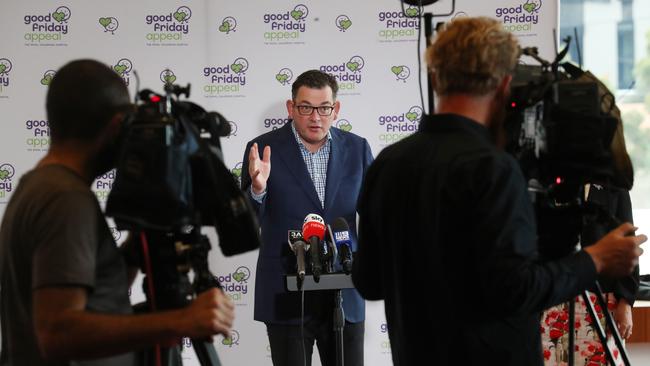
Hospitals ‘trimmed to bone’
Australian Medical Association Victorian president Roderick McRae said the Victorian government’s plan to increase elective surgeries to 125 per cent would need to be outsourced to surgery hubs and private hospitals.
“Hospitals have trimmed everything to the bone,” Dr McRae said.
“At the moment this is beyond a perfect storm. A perfect storm refers to three cyclones forming into a mega-cyclone – we have about eight. We need absolute reform.”
Victorian Healthcare Association chief executive Tom Symondson said the biggest factor affecting the health system’s ability to meet demand was the shortage of healthcare workers, including in aged care.
“Before the pandemic arrived, many Victorian health services, particularly outside of Melbourne, were struggling to find enough qualified workers,” he said.
“The pandemic has worsened this, and the shortage has expanded across the state. It doesn’t matter how many beds you have in a hospital or aged-care service, if you don’t have enough staff to care for people in those beds, you can’t deliver care.”
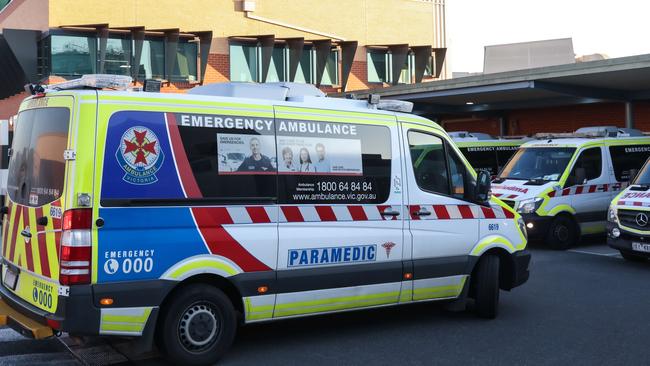
A government spokesman acknowledged: “The global pandemic has played a major part in putting pressure on the system, but it’s not the only issue.
“We’re also seeing deferred care, a spike in winter respiratory illnesses, record ambulance demand and bed block issues caused by a lack of funding for the NDIS and the aged care sector. We know the health system is under extraordinary pressure at the moment, which is why we have taken measures to help it in both the short-term and long-term – and why we’ll work with the new Albanese government to ensure we get our fair share of funding.”
The government further flagged that as part of its budget earlier this month it planned to recruit or train 7000 additional health workers, including 5000 nurses.
Opposition health spokeswoman Georgie Crozier said years of mismanagement had exacerbated the crisis.
“Victoria deserves better than the mismanagement and blame shifting that has left us with the worst health crisis in the nation, and one which is putting the lives of Victorians at risk,” she said.




